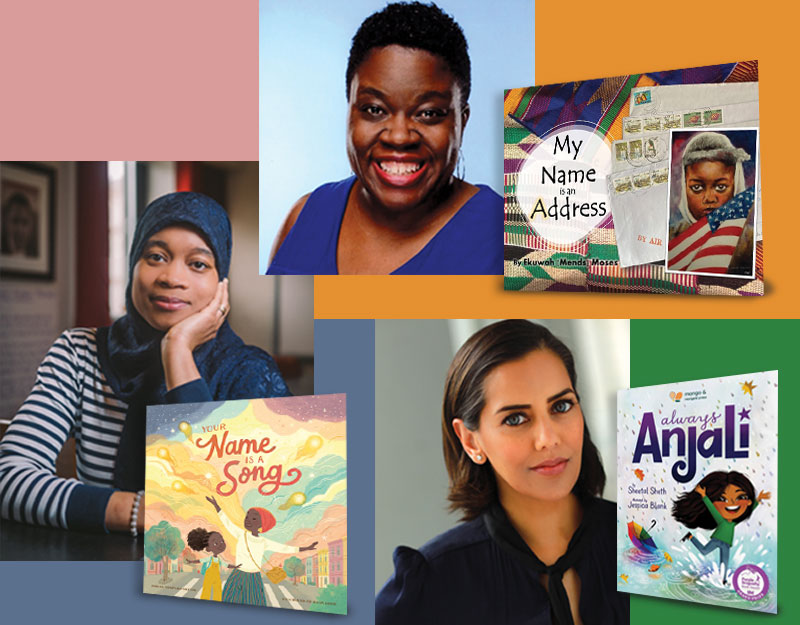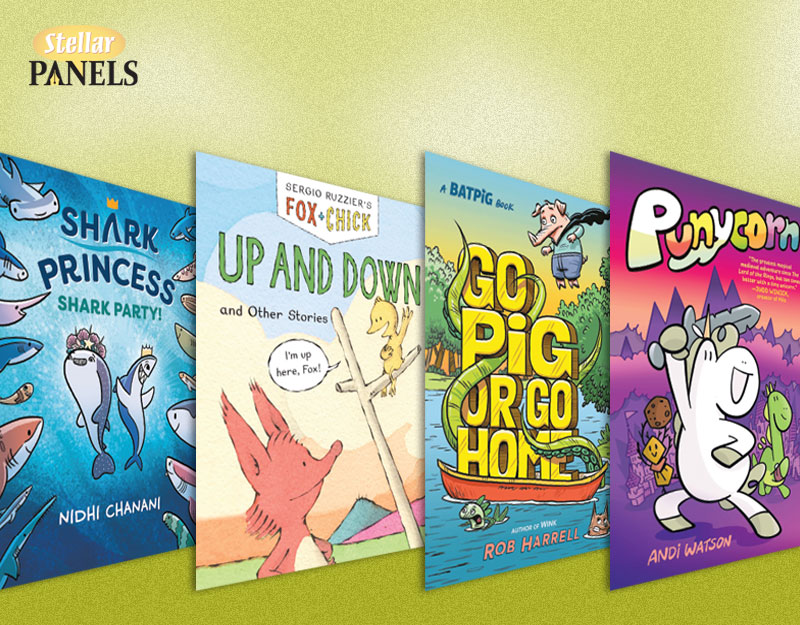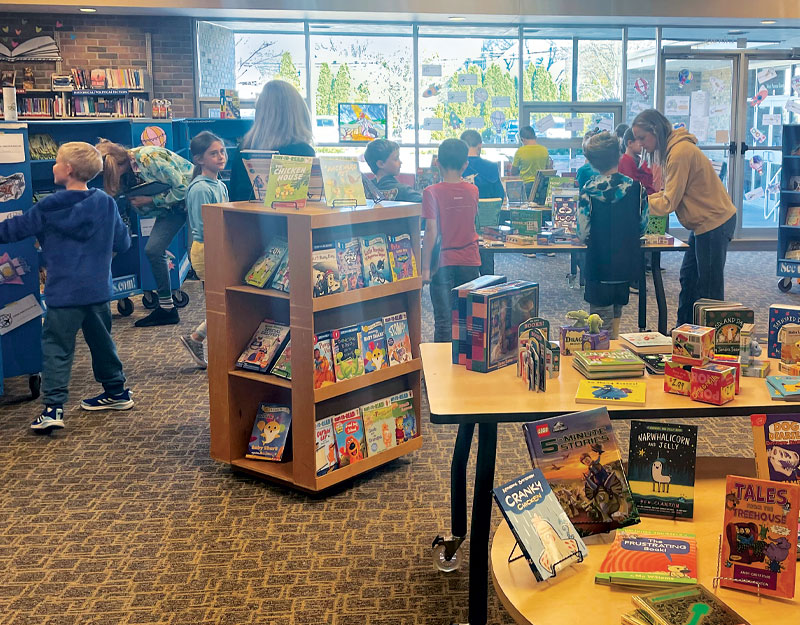2020 Charlotte Huck Award for Outstanding Fiction: Room on Our Rock
2020 Winner of the Charlotte Huck Award for Outstanding Fiction

Room On Our Rock
Written by Kate and Jol Temple and Illustrated by Terri Rose Baynton
Published in 2019 by Kane Miller
ISBN 978-1-61067-902-2
Grades PK-3
Book Review
“There are two sides to every story.” This well known phrase appears on the cover of Australian authors Kate and Jol Temple’s unusual picture book along with the image of two seals, presumably a child and caregiver duo. An initial read of this book prompts expressions of concern for this pair as they travel away from their storm-ravaged home only to be met with the words, “There’s no room on our rock,” when they seek shelter. These words are spoken by a pod of a different pinniped species, who make it clear that strangers are not welcome. Immersive double page spreads rendered in watercolor hold one line of text each, often employing phrases that span the page turn (a literary technique known as enjambment). A palette of blues and greys convey the gravity of the situation while line and shape imply tension and action. At the conclusion of the book, readers find this invitation: “No room on this rock? Can it be true? Read back to front for another point of view.” The text is reverse poetry and read from back to front, it offers an entirely different reading experience. In this version, the displaced seals are immediately and warmly welcomed. An anthropomorphic exploration of exclusion and inclusion, displacement and natural disasters, this title provides an intriguing entry point into discussions about sharing resources and multiple perspectives. As an added benefit, in this uniquely constructed book, teachers will find rich opportunities for developing visual literacy and language arts.
Teaching Ideas: Invitations for Your Classroom
Grades PK – 3
A Close Reading: Developing Visual Literacy. After an initial reading of Room on Our Rock, provide students with time to examine and discuss the book in small groups. Ask students to notice how Terri Rose Boynton has created images that can be read in two ways and how Kate and Jol Temple have crafted language that reads so differently in reverse. Consider how one text can provide very different emotional experiences when experienced from a new angle.
ADVERTISEMENT
ADVERTISEMENT
Building Fluency: The Role of Expression. Room on Our Rock provides an excellent opportunity to talk about expression in reading aloud and the connection with reading comprehension. After you have modeled an initial reading of the text (forwards and backwards), invite your students to talk about how a reader’s expression changes along with the meaning changes conveyed by the text and illustrations. Listen to a young student reading the text aloud in this Scholastic Australia video. Provide tablets or other audiovisual recording devices and ask students to practice their own readings of Room on Our Rock.
Reverse Poetry. In their interview on ABC National Radio, Kate and Jol Temple describe their purposes and processes for writing Room on our Rock. Explore the form of reverse poetry through a close reading of the text of the book – consider rewriting the text on chart paper or typing up the text and projecting it in the classroom. Ask students to identify how the phrases of the poem connect when reading the forwards and when reading it in reverse. Next introduce Marilyn Singer’s collection of reverso poems and share the resources in which she discusses her process for writing these poems (see further resources below). After this investigation into the structure and composition of these poems, invite your students to try writing their own.
Duet Model Reading: Room on our Rock and Shelter. Another Charlotte Huck Award winning title, Celine Claire’s Shelter is an excellent pairing for Room on Our Rock. Each explores the impact of a natural disaster, outreach to others, and a resolution that emphasizes the value of sharing. Students can compare how visual images and language are used in very different ways to create plot, tension, emotional experiences, and theme.
How to Welcome. Read Room on our Rock along with other titles that explore what it means to welcome a new community member, such as All Are Welcome, Shelter, I’m New Here, and The Day War Came (a Huck honor award winner that explores the refugee experience). Be sure to include Jacqueline Woodson’s Each Kindness, a title that like, Room on Our Rock, provides a counter example, exploring the consequences of not accepting newcomers. Next, invite your students to discuss how they welcome newcomers to their school committee. Make a list of their ideas. If time allows, build their list into a co-authored procedural text that describes “How to Welcome.”
Charlotte Huck Award. The Charlotte Huck Award for Outstanding Fiction for Children was established by the National Council of Teachers of English (NCTE) in 2014 to recognize books for ages 5-12 that have the “potential to transform children’s lives by inviting compassion, imagination, and wonder.” Write these three words on an anchor chart and ask your students to offer their understandings of and definitions for these terms. Next, gather a collection of books that have been recognized by this award and create a browsing area so that students can read these books over time. As they finish a book, students should document which of the three terms (compassion, imagination, and wonder) they connect to the book. They could write the title and their responses on a chart paper posted near the books, or they could place index cards or sticky notes recording their responses right on/in the books themselves. Consider holding a Mock Huck Award for newly published titles that you and your students identify with these criteria.
Critical Literacy
Perspective-Taking. To support students with the critical skill of perspective-taking, read a series of books that offer varying perspectives on the events and experiences explored in the text. Include picture books such as, Same, Same But Different by Jenny Sue Kostecki-Shaw, Mirror by Jeannie Baker, Anna Kang’s You Are (Not) Small, The Day the Crayons Quit by Drew Daywalt, and Brendan Wenzel’s A Stone Sat Still and They All Saw a Cat. After students have the opportunity to experience these texts, invite them to create a text that represents multiple points of view. Depending on the age of your students, their texts could be written pieces, works of art, or performance.
Refugee Text Set. For older students, Room on Our Rock could serve as an entry point for talking about the global refugee crisis, climate change, and climate migration. In the Further Explorations section below, you will find links to blog entries that have addressed these topics.
Further Explorations
Online Resources
NCTE’s Charlotte Huck Award for Outstanding Fiction
Marilyn Singer: Reverso Poetry: Writing Verse in Reverse
Penguin: Marilyn Singer’s Reverso Poetry Collection
No Water River: Children’s Poetry Video “In the Hood” by Marilyn Singer
Related Classroom Bookshelf Resources:
Love in Action: Children’s Literature to Promote Hope and Counter Fear
Children as Refugees: The Syrian Crisis
Books
Baker, J. (2010). Mirror. Somerville, MA: Candlewick.
Claire, C. (2017). Shelter. Ill. by Q. Leng. Toronto, CA: Kids Can Press.
Daywalt, D. (2013). The day the crayons quit. Ill. O. Jeffers. New York: Philomel.
Davies, N. (2018). The day war came. Ill. by R. Cobb. Somerville, MA: Candlewick Press.
Kang, A. (2015). You are (not) small. Ill. By C. Weyant. Two Lions.
Kostecki-Shaw, J.S. (2011). Same, same but different. New York: Henry Holt.
O’Brien, A.S. (2015). I’m new here. Cambridge, MA: Charlesbridge.
Latham, & Waters, (2018). Can I touch your hair?: Poems of race, mistakes, and friendship. Ill. by Qualls, S. & Alko, S. Minneapolis, MN: Carolrhoda Books.
Penfold, A. (2018). All are welcome. Ill by S. Kaufman. New York: Knopf.
Singer, M. (2016). Echo echo: Reverso poems about Greek Myths. Ill. by J. Masse. New York: Dial.
Singer, M. (2013). Follow follow: A book of Reverso poems. New York: Dial.
Singer, M. (2010). Mirror mirror: A book of reversible verse. New York: Dutton.
Wenzel, B. (2019). A stone sat still. San Francisco, CA: Chronicle Books.
Wenzel, B. (2016). They all saw a cat. San Francisco, CA: Chronicle Books.
Woodson, J. (2012). Each kindness. Ill. by E.B. Lewis. New York: Nancy Paulsen.
Filed under: Announcements, Fiction, Fiction Picture Books, Picture Books
About Erika Thulin Dawes
Erika is a professor of language and literacy at Lesley University. A former classroom teacher, reading specialist, and literacy supervisor, she now teaches courses in children’s literature, early literacy, and literacy methods. Erika is the co-author of Learning to Write with Purpose, Teaching with Text Sets, and Teaching to Complexity.
ADVERTISEMENT
ADVERTISEMENT
SLJ Blog Network
The Moral Dilemma of THE MONSTER AT THE END OF THIS BOOK
Cover Reveal and Q&A: The One and Only Googoosh with Azadeh Westergaard
Winnie-The-Pooh | Review
Parsing Religion in Public Schools
ADVERTISEMENT







